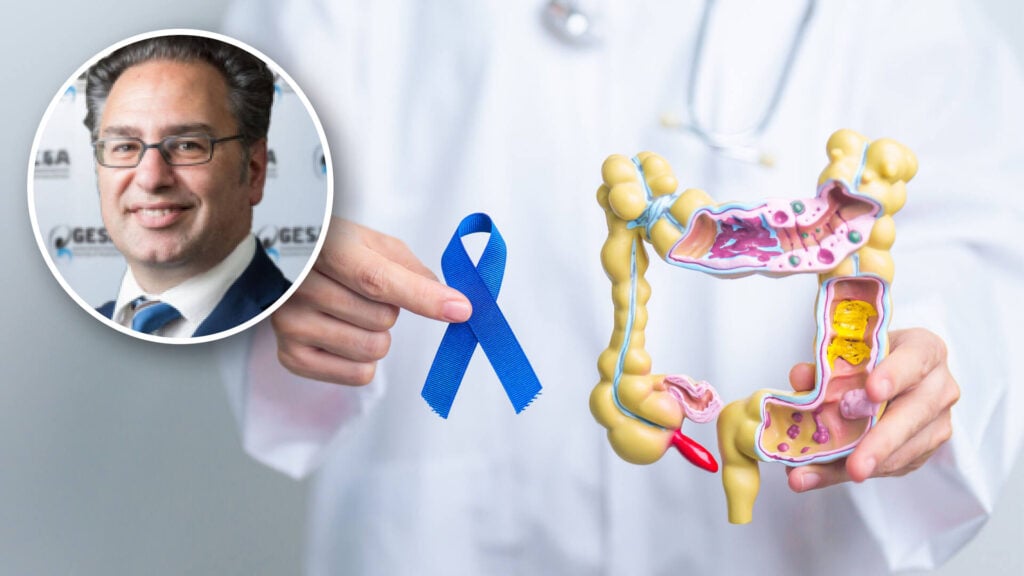Young onset colorectal cancer (CRC), diagnosed in people under 50, is emerging as a growing global concern. Australia records some of the highest rates worldwide.
Professor Alex Boussioutas, academic clinician at Monash University and Director of Gastroenterology at The Alfred, confirms the trend.
“Australian rate of increase in incidence of CRC in young ages is one of the highest in the world,” he tells Neos Kosmos.
Professor Boussioutas stresses while rate of cancer in younger people is rising, the total numbers remain small compared to those over 50.
At the same time, he explains, many countries are seeing a decline in older age groups.
“We are just seeing this in Australia as well and is likely tied to improving screening rates in over 50-year-olds,” he adds.
Professor Boussioutas, president of the Gastroenterology Society of Australia (GESA) — and, according to him, “the only” Greek Australian to have held the role — as well as Director of Clinical Genetics and Genomics at The Alfred, highlights another concern.
“Australia has one of the highest prevalence rates for bowel cancer in the world,” alongside New Zealand, he says, adding that South Korea may now lead.
What’s driving the rise?
According to Professor Boussioutas’s experience, “it is always a combination” of genetic and environmental factors.
“There is good evidence that about 25% of the young onset CRC (colorectal cancer) have a family history and indeed may have a highly penetrant genetic predisposition.”
“There is no doubt environmental conditions” also “play a role in incidence of CRC,” says the Greek Australian president of GESA.
While the exact factors that account for this are “unknown,” obesity and the rising prevalence of metabolic syndrome in young adults have been linked to young-onset colorectal cancer.
Lifestyle habits, such as high consumption of red meat, highly processed foods, and low physical activity, “may also be a factor.”
However, “proving these links is difficult,” as long-term studies on diet — the kind needed to establish cancer as an outcome — are “hard to conduct.”
If diet matters, could eating patterns like the Mediterranean diet—common in parts of Europe—help reduce the risk?
Professor Boussioutas says since it is “considered one of the protective diets,” it “may” help explain why some European countries, including Greece, have lower rates than Australia.
Still, he notes, other “lifestyle issues” could “conflate this observation.”
Another “interesting area of research” focuses on microbiome.
“There are many associations that have been made with various profiles of bacteria that are reported in different populations,” says the president of GESA.
Individual differences in ethnicity, diet, medication use, and other health conditions complicate the picture.
“These all need to be factored into analysis, and I am not sure it has been done very well in many studies.”
Early signs hard to detect
“CRC tends to have no symptoms in the majority of cases,” says Professor Boussioutas.
When symptoms do appear, usually in more advanced cancer, they can include:
– Rectal bleeding
– A new change in bowel habits
– Unintentional weight loss
However, “the likelihood of a cancer in a 30-year-old is still very uncommon.”
This makes it difficult for doctors to balance early detection with avoiding unnecessary tests, especially with limited resources, explains Professor Boussioutas.
World Congress of Gastroenterology
The World Congress of Gastroenterology will be held in Melbourne this year, from September 19–22, in association with the annual Gastroenterology Week.
Experts from around the world will join as speakers, addressing topics across the full spectrum of Gastroenterology — from GI cancer to sustainability in healthcare.
“It is great to see an international focus with representation from around the world,” says the president of GESA.
A keynote lecture will be delivered by Professor Uri Ladabaum from Stanford University, whose “interest is prevention of CRC” and is “a key opinion leader in our discussion of YOCRC.”
The event will bring together participants from gastroenterology, GI surgery, nursing, nutrition, the pharmaceutical and device industries, as well as scientists, trainees, and students, and other specialists such as pathologists and radiologists.
Alex Boussioutas is Director of Gastroenterology and Director of Clinical Genetics and Genomics at The Alfred, and a tenured academic clinician in the Department of Medicine at the University of Melbourne’s Royal Melbourne Hospital (RMH).
He leads research programs in upper gastrointestinal cancers, focusing on population health, early detection technologies, and genomic investigation of gastric cancer.
Professor Boussioutas was the only Australian collaborator in The Cancer Genome Atlas Network for Upper Gastrointestinal Cancer, contributing to landmark studies published in Nature.
He also conducts research in colorectal cancer through the Familial Cancer Clinic at Peter MacCallum and collaborations with the University of Melbourne’s School of Population Health.









